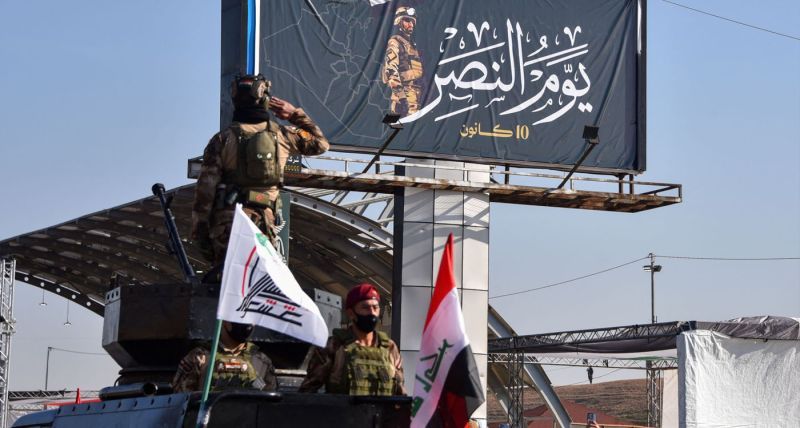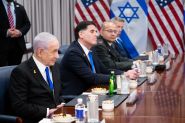- Home
- Middle East
- Caught Between Missiles and Militias: Iraq Struggles Under Regional Strain

A military parade organized by the Iraqi army, Hashd al-Shaabi and police, takes place on a highway during a ceremony marking the anniversary of the defeat of the Islamic State group in the northern Iraqi city of Mosul on December 10, 2024. ©Zaid al-Obaidi / AFP
As Israeli airstrikes and Iranian missile launches intensify across the Middle East, Iraq finds itself trapped in a precarious position amid a mounting diplomatic and military storm. Still fragile after decades of conflict, the country’s geographic and strategic location leaves it exposed to the escalating rivalry between two powerful regional actors.
Iraq’s hard-won stability now hangs by a thread, threatened by a conflict it is desperate to keep at bay. Navigating this volatile landscape, Baghdad is walking a diplomatic tightrope between Tehran and Washington, striving to protect its sovereignty and avoid being dragged into open hostilities.
Iraqi Airspace: A Strategic Corridor in the Crossfire
Covering 438,000 square kilometers and sharing a long border with Iran, Iraq has become one of the most vulnerable frontiers in the growing confrontation between Israel and Iran. Its skies have effectively turned into a corridor for military flights and missile trajectories from both sides.
Israeli jets reportedly use Iraqi airspace en route to targets in Iran, while Iranian missiles head toward Israel crossing the same skies. The United States, aware of Iraq’s strategic exposure, partially evacuated its embassy in Baghdad, warning that Iraq risks becoming an “unwilling corridor” for military operations.
The sudden Israeli strike on Iran prompted Iraqi Prime Minister Mohammed Shia al-Sudani to issue a stern condemnation, labeling the attack a “blatant violation of international law” and an “act of aggression.” He affirmed Iraq’s firm stance against any military use of its airspace or territory targeting neighboring countries.
Baghdad has even filed a formal complaint with the UN Security Council and reminded Washington of its obligations under the 2008 Strategic Framework Agreement, which prohibits the use of Iraqi soil for attacks on other states. Iraq has since urged the US to block Israeli overflights.
Pro‑Iran Militias: A Parallel Power Challenging Baghdad
Complicating matters further is Iraq’s internal dynamic, where pro-Iran Shia militias, collectively known as the Popular Mobilization Forces (PMF) or Hashd al-Shaabi, operate with significant autonomy despite formal integration into Iraq’s security forces.
Many of these factions pursue their own agendas, often diverging from Baghdad’s official policy, according to analysis from the Quincy Institute for Responsible Statecraft. Their actions include unilateral operations, such as the high-profile abduction of researcher Elizabeth Tsurkov, limiting Prime Minister al-Sudani’s ability to assert full control.
Amid the heightened regional tensions, anti-American rhetoric has resurged among militia leaders. Figures like Abu Hussein al-Hamidawi of Kataib Hezbollah have warned of strikes against US bases should Washington intervene, while Akram al-Kaabi, leader of Harakat Hezbollah al Nujaba, accused the US of “cooperating” with Israel.
Such threats, echoing the climate after the 2020 assassination of Iranian General Qassem Soleimani, raise fears of renewed attacks on American forces. The roughly 2,500 US troops in Iraq, officially there to combat ISIS, now face growing risks as militia hostility intensifies.
Between Tehran and Washington, Iraq Is Feeling the Squeeze
For Washington, the stakes are high: blocking Israeli overflights would mean confronting a close ally, but turning a blind eye risks fueling the anger of pro-Iran militias and Tehran alike. A full US withdrawal could destabilize counterterrorism efforts and create a vacuum ripe for ISIS resurgence.
The Institute for the Study of War (ISW) warns that Iran has prepared strikes against US bases in Iraq, with allied militias poised to act should the conflict escalate.
Meanwhile, Iraq remains heavily dependent on Iran for electricity, with a third of its energy needs met by Iranian gas. Israeli strikes have already damaged parts of Iran’s infrastructure, putting energy deliveries at risk. Tehran has a history of halting exports during periods of heightened tension. For Baghdad, a prolonged cutoff would trigger widespread blackouts, fueling public discontent.
Iraq’s weak air defense system adds yet another layer of vulnerability. According to the QIRS, despite recent investments, Iraq's current systems are still inadequate for intercepting aerial threats. On June 15, US batteries in Erbil had to intercept an Iranian drone. For now, Baghdad remains reliant on its allies to secure its airspace.
Caught in overlapping diplomatic, energy, military and domestic pressures, Iraq struggles to maintain its fragile balance. But if regional tensions spiral further, the country risks becoming one of the earliest and most devastating casualties of the wider Middle East conflict.
Read more




Comments